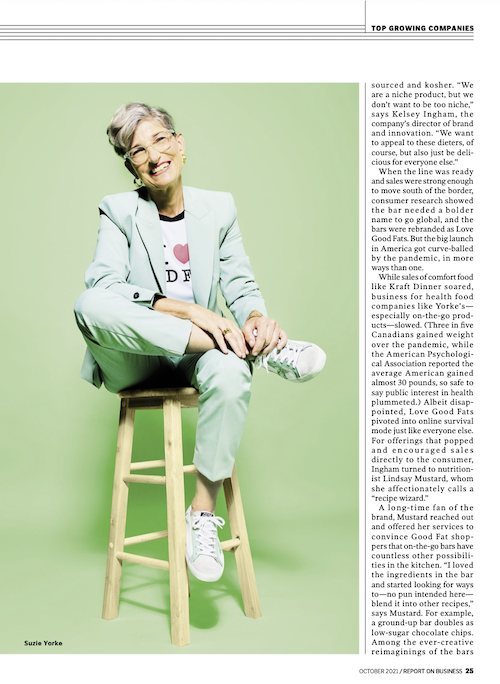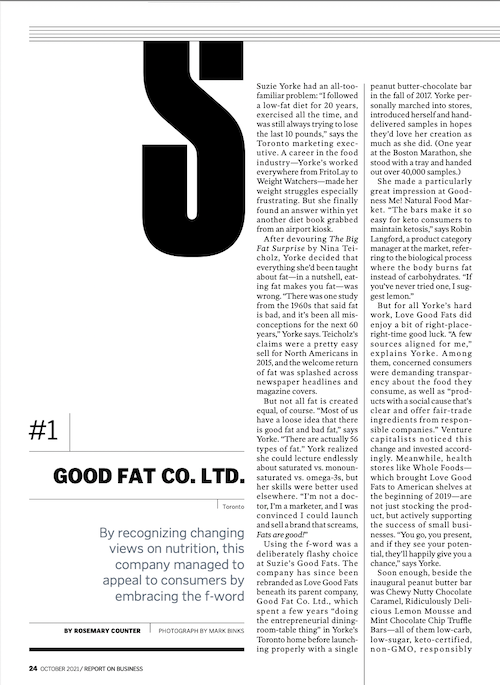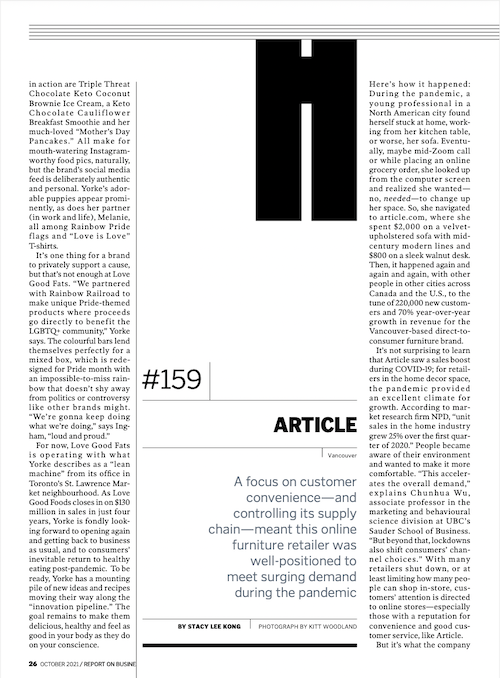Good Fats Co. Ltd
How one company appealed to consumers by embracing the f-word
Suzie Yorke had an all-too-familiar problem: “I followed a low-fat diet for 20 years, exercised all the time, and was still always trying to lose the last 10 pounds,” says the Toronto marketing executive. A career in the food industry—Yorke’s worked everywhere from FritoLay to Weight Watchers—made her weight struggles especially frustrating. But she finally found an answer within yet another diet book grabbed from an airport kiosk.
After devouring The Big Fat Surprise by Nina Teicholz, Yorke decided that everything she’d been taught about fat—in a nutshell, eating fat makes you fat—was wrong. “There was one study from the 1960s that said fat is bad, and it’s been all misconceptions for the next 60 years,” Yorke says. Teicholz’s claims were a pretty easy sell for North Americans in 2015, and the welcome return of fat was splashed across newspaper headlines and magazine covers.
But not all fat is created equal, of course. “Most of us have a loose idea that there is good fat and bad fat,” says Yorke. “There are actually 56 types of fat.” York realized she could lecture endlessly about saturated vs. monounsaturated vs. omega-3s, but her skills were better used elsewhere. “I’m not a doctor, I’m a marketer, and I was convinced I could launch and sell a brand that screams, Fats are good!”
Using the f-word was a deliberately flashy choice at Suzie’s Good Fats. The company has since been rebranded as Love Good Fats beneath its parent company, Good Fats Co. Ltd., which spent a few years “doing the entrepreneurial dining-room-table thing” in Yorke’s Toronto home before launching properly with a single peanut butter-chocolate bar in the fall of 2017. Yorke personally marched into stores, introduced herself and hand-delivered samples in hopes they’d love her creation as much as she did. (One year at the Boston Marathon, she stood with a tray and handed out over 40,000 samples.)
She made a particularly great impression at Goodness Me! Natural Food Market. “The bars make it so easy for keto consumers to maintain ketosis,” says Robin Langford, a product category manager at the market, referring to the biological process where the body burns fat instead of carbohydrates. “If you’ve never tried one, I suggest lemon.”
But for all Yorke’s hard work, Love Good Fats did enjoy a bit of right-place-right-time good luck. “A few sources aligned for me,” explains Yorke. Among them, concerned consumers were demanding transparency about the food they consume, as well as “products with a social cause that’s clear and offer fair-trade ingredients from responsible companies.” Venture capitalists noticed this change and invested accordingly. Meanwhile, health stores like Whole Foods—which brought Love Good Fats to American shelves at the beginning of 2019—are not just stocking the product, but actively supporting the success of small businesses. “You go, you present, and if they see your potential, they’ll happily give you a chance,” says Yorke.
Soon enough, beside the inaugural peanut butter bar was Chewy Nutty Chocolate Caramel, Ridiculously Delicious Lemon Mousse and Mint Chocolate Chip Truffle Bars—all of them low-carb, low-sugar, keto-certified, non-GMO, responsibly sourced and kosher. “We are a niche product, but we don’t want to be too niche,” says Kelsey Ingham, the company’s director of brand and innovation. “We want to appeal to these dieters, of course, but also just be delicious for everyone else.”
When the line was ready and sales were strong enough to move south of the border, consumer research showed the bar needed a bolder name to go global, and the bars were rebranded as Love Good Fats. But the big launch in America got curve-balled by the pandemic, in more ways than one.
While sales of comfort food like Kraft Dinner soared, business for health food companies like Yorke’s—especially on-the-go products—slowed. (Three in five Canadians gained weight over the pandemic, while the American Psychological Association reported the average American gained almost 30 pounds, so safe to say public interest in health plummeted.) Albeit disappointed, Love Good Fats pivoted into online survival mode just like everyone else. For offerings that popped and encouraged sales directly to the consumer, Ingham turned to nutritionist Lindsay Mustard, whom she affectionately calls a “recipe wizard.”
A long-time fan of the brand, Mustard reached out and offered her services to convince Good Fat shoppers that on-the-go bars have countless other possibilities in the kitchen. “I loved the ingredients in the bar and started looking for ways to—no pun intended here—blend it into other recipes,” says Mustard. For example, a ground-up bar doubles as low-sugar chocolate chips. Among the ever-creative reimaginings of the bars in action are Triple Threat Chocolate Keto Coconut Brownie Ice Cream, a Keto Chocolate Cauliflower Breakfast Smoothie and her much-loved “Mother’s Day Pancakes.” All make for mouth-watering Instagram-worthy food pics, naturally, but the brand’s social media feed is deliberately authentic and personal. Yorke’s adorable puppies appear prominently, as does her partner (in work and life), Melanie, all among Rainbow Pride flags and “Love is Love” T-shirts.
It’s one thing for a brand to privately support a cause, but that’s not enough at Love Good Fats. “We partnered with Rainbow Railroad to make unique Pride-themed products where proceeds go directly to benefit the LGBTQ+ community,” Yorke says. The colourful bars lend themselves perfectly for a mixed box, which is redesigned for Pride month with an impossible-to-miss rainbow that doesn’t shy away from politics or controversy like other brands might. “We’re gonna keep doing what we’re doing,” says Ingham, “loud and proud.”
For now, Love Good Fats is operating with what Yorke describes as a “lean machine” from its office in Toronto’s St. Lawrence Market neighbourhood. As Love Good Foods closes in on $130 million in sales in just four years, Yorke is fondly looking forward to opening again and getting back to business as usual, and to consumers’ inevitable return to healthy eating post-pandemic. To be ready, Yorke has a mounting pile of new ideas and recipes moving their way along the “innovation pipeline.” The goal remains to make them delicious, healthy and feel as good in your body as they do on your conscience.


